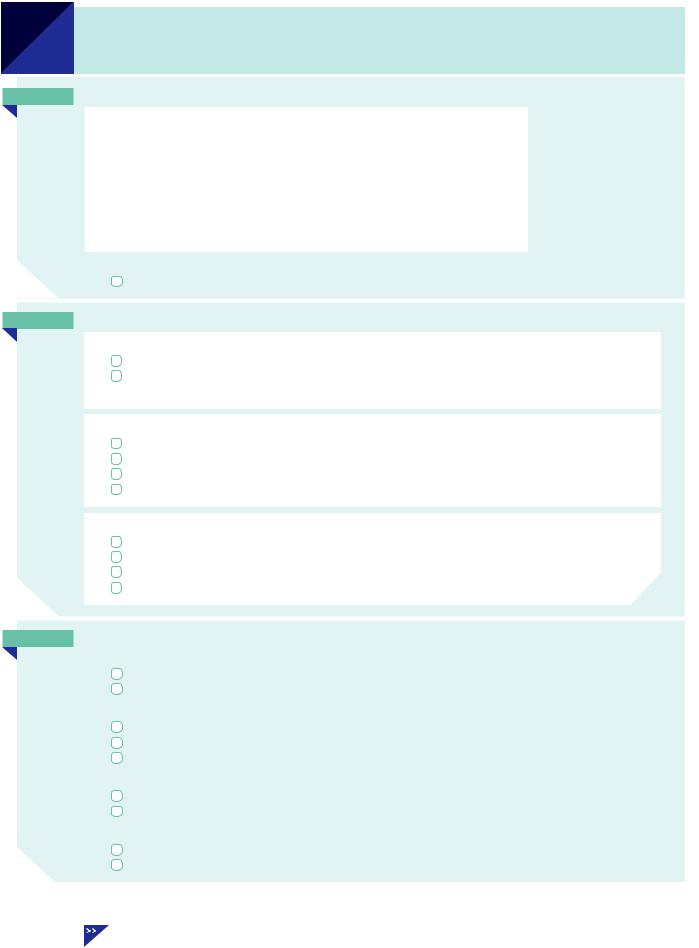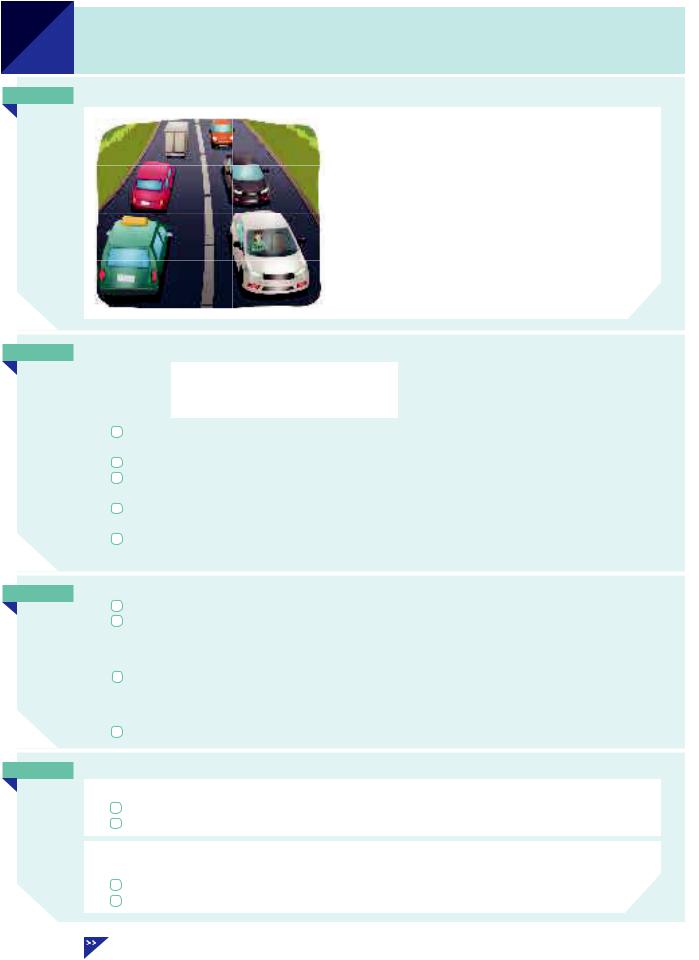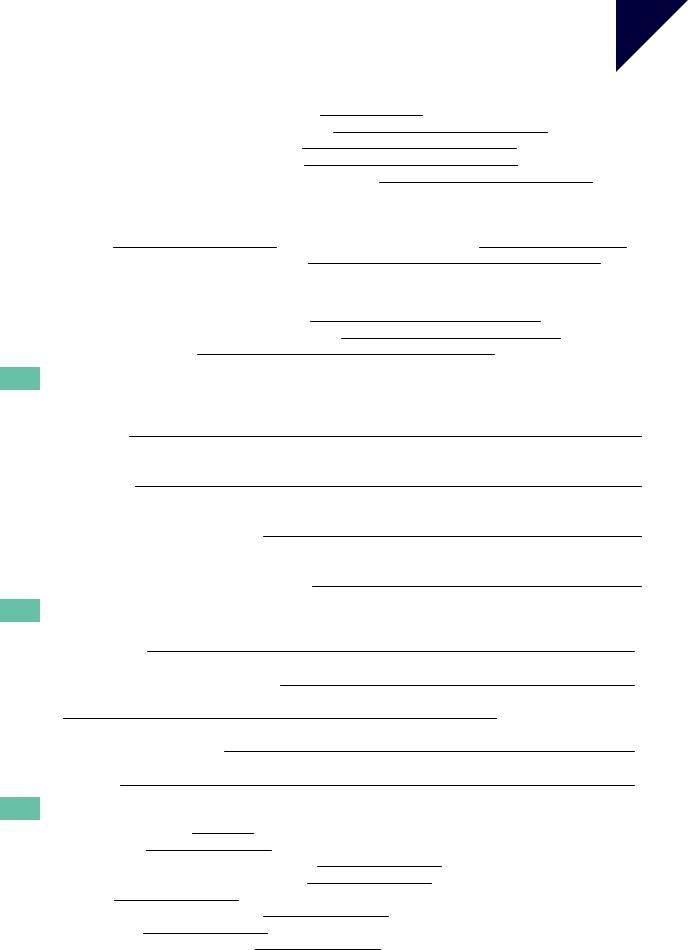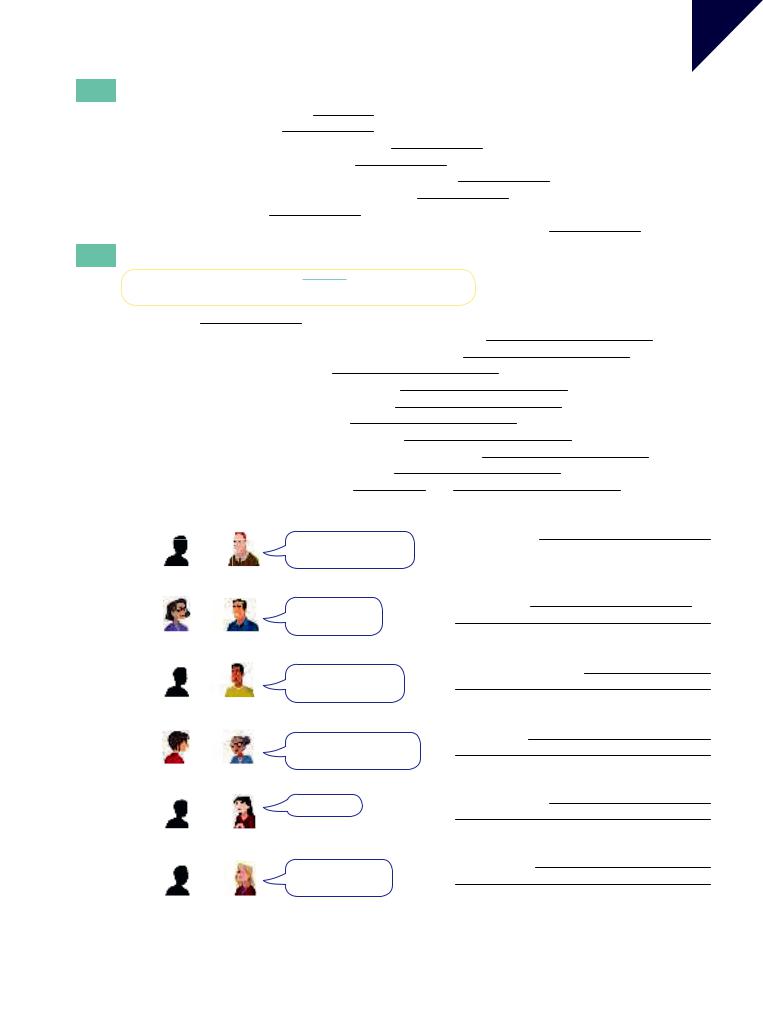
- •Contents
- •Thanks
- •To the student
- •To the teacher
- •3 Present continuous and present simple 1 (I am doing and I do)
- •10 Present perfect continuous and simple (I have been doing and I have done)
- •11 how long have you (been) … ?
- •12 for and since when … ? and how long … ?
- •13 Present perfect and past 1 (I have done and I did)
- •14 Present perfect and past 2 (I have done and I did)
- •15 Past perfect (I had done)
- •16 Past perfect continuous (I had been doing)
- •17 have and have got
- •18 used to (do)
- •19 Present tenses (I am doing / I do) for the future
- •20 I’m going to (do)
- •21 will and shall 1
- •22 will and shall 2
- •23 I will and I’m going to
- •24 will be doing and will have done
- •26 can, could and (be) able to
- •27 could (do) and could have (done)
- •28 must and can’t
- •29 may and might 1
- •30 may and might 2
- •31 have to and must
- •32 must mustn’t needn’t
- •33 should 1
- •34 should 2
- •35 I’d better … it’s time …
- •36 would
- •39 if I knew … I wish I knew …
- •40 if I had known … I wish I had known …
- •41 wish
- •42 Passive 1 (is done / was done)
- •43 Passive 2 (be done / been done / being done)
- •44 Passive 3
- •45 it is said that … he is said to … he is supposed to …
- •46 have something done
- •47 Reported speech 1 (he said that …)
- •48 Reported speech 2
- •49 Questions 1
- •52 Question tags (do you? isn’t it? etc.)
- •53 Verb + -ing (enjoy doing / stop doing etc.)
- •54 Verb + to … (decide to … / forget to … etc.)
- •55 Verb (+ object) + to … (I want you to …)
- •56 Verb + -ing or to … 1 (remember, regret etc.)
- •57 Verb + -ing or to … 2 (try, need, help)
- •58 Verb + -ing or to … 3 (like / would like etc.)
- •59 prefer and would rather
- •60 Preposition (in/for/about etc.) + -ing
- •61 be/get used to … (I’m used to …)
- •63 there’s no point in -ing, it’s worth -ing etc.
- •64 to … , for … and so that …
- •65 Adjective + to …
- •66 to … (afraid to do) and preposition + -ing (afraid of -ing)
- •67 see somebody do and see somebody doing
- •68 -ing clauses (He hurt his knee playing football.)
- •69 Countable and uncountable 1
- •70 Countable and uncountable 2
- •71 Countable nouns with a/an and some
- •74 the 2 (school / the school etc.)
- •75 the 3 (children / the children)
- •77 Names with and without the 1
- •78 Names with and without the 2
- •79 Singular and plural
- •80 Noun + noun (a bus driver / a headache)
- •81 -’s (your sister’s name) and of … (the name of the book)
- •82 myself/yourself/themselves etc.
- •83 a friend of mine my own house on my own / by myself
- •84 there … and it …
- •85 some and any
- •87 much, many, little, few, a lot, plenty
- •90 all every whole
- •91 each and every
- •92 Relative clauses 1: clauses with who/that/which
- •94 Relative clauses 3: whose/whom/where
- •95 Relative clauses 4: extra information clauses (1)
- •96 Relative clauses 5: extra information clauses (2)
- •97 -ing and -ed clauses (the woman talking to Tom, the boy injured in the accident)
- •98 Adjectives ending in -ing and -ed (boring/bored etc.)
- •99 Adjectives: a nice new house, you look tired
- •100 Adjectives and adverbs 1 (quick/quickly)
- •102 so and such
- •104 quite, pretty, rather and fairly
- •105 Comparative 1 (cheaper, more expensive etc.)
- •106 Comparative 2 (much better / any better etc.)
- •107 Comparative 3 (as … as / than)
- •108 Superlative (the longest / the most enjoyable etc.)
- •109 Word order 1: verb + object; place and time
- •110 Word order 2: adverbs with the verb
- •111 still any more yet already
- •112 even
- •114 in case
- •116 as (as I walked … / as I was … etc.)
- •117 like and as
- •119 during for while
- •121 at/on/in (time)
- •122 on time and in time at the end and in the end
- •123 in/at/on (position) 1
- •124 in/at/on (position) 2
- •125 in/at/on (position) 3
- •126 to, at, in and into
- •127 in/on/at (other uses)
- •129 Noun + preposition (reason for, cause of etc.)
- •130 Adjective + preposition 1
- •131 Adjective + preposition 2
- •132 Verb + preposition 1 to and at
- •134 Verb + preposition 3 about and of
- •135 Verb + preposition 4 of/for/from/on
- •136 Verb + preposition 5 in/into/with/to/on
- •137 Phrasal verbs 1 Introduction
- •138 Phrasal verbs 2 in/out
- •139 Phrasal verbs 3 out
- •142 Phrasal verbs 6 up/down
- •143 Phrasal verbs 7 up (1)
- •144 Phrasal verbs 8 up (2)
- •145 Phrasal verbs 9 away/back
- •Additional exercises
- •Study guide
- •Key to Exercises
- •Key to Additional exercises (see page 302)
- •Key to Study guide
- •Index

Unit
60 Preposition (in/for/about etc.) + -ing
AIf a preposition (in/for/about etc.) is followed by a verb, the verb ends in -ing:
|
preposition |
verb (-ing) |
|
Are you interested |
in |
working |
for us? |
I’m not good |
at |
learning |
languages. |
Kate must be fed up |
with |
studying. |
|
What are the advantages |
of |
having |
a car? |
Thanks very much |
for |
inviting |
me to your party. |
How |
about |
meeting |
for lunch tomorrow? |
Why don’t you go out |
instead of |
sitting |
at home all the time? |
Amy went to work |
in spite of |
feeling |
ill. |
|
|
|
|
You can also say ‘instead of somebody doing something’, ‘fed up with people doing something’ etc. : I’m fed up with people telling me what to do.
BWe say:
before -ing, ater -ing:
Before going out, I phoned Sarah. (not Before to go out)
What did you do ater leaving school?
You can also say ‘Before I went out …’ and ‘… ater you let school’.
by -ing (to say how something happens):
You can improve your English by reading more.
She made herself ill by not eating properly.
Many accidents are caused by people driving too fast.
The burglars got into the house by breaking a window and climbing in.
without -ing:
We ran ten kilometres without stopping.
It was a stupid thing to say. I said it without thinking.
She needs to work without people disturbing her. or … without being disturbed. I have enough problems of my own without having to worry about yours.
Cto + -ing (look forward to doing something etc.)
We oten use to + infinitive (to do / to see etc.):
We decided to travel by train.
Would you like to meet for lunch tomorrow?
But to is also a preposition (like in/for/about/with etc.). For example:
We went from Paris to Geneva.
I prefer tea to cofee.
Are you looking forward to the weekend?
If we use a preposition + verb, the verb ends in -ing:
I’m fed up with travelling by train.
How about going away this weekend?
So, when to is a preposition and it is followed by a verb, we use to -ing:
I prefer driving to travelling by train. (not to travel)
Are you looking forward to going on holiday? (not looking forward to go)
|
be/get used to -ing Unit 61 Verb + preposition + -ing Unit 62 while/when -ing Unit 68B |
120 |
in spite of Unit 113 Prepositions Units 121–136 |

Exercises |
|
|
|
|
|
|
Unit |
||
|
|
|
|
|
|
60 |
|||
|
|
|
|
||||||
|
|
||||||||
60.1 |
Complete the second sentence so that it means the same as the first. |
||||||||
1 |
Why is it useful to have a car? |
|
|
|
|
||||
|
|
What are the advantages of having a car |
|
? |
|||||
2 |
I don’t intend to apply for the job. |
|
|
|
|
||||
|
|
I have no intention of |
|
|
|
. |
|||
3 |
Helen has a good memory for names. |
|
|
|
|||||
|
|
Helen is good at |
|
|
|
. |
|||
4 |
You probably won’t win the lottery. You have little chance. |
||||||||
|
|
You have little chance of |
|
|
. |
||||
5 |
Did you get into trouble because you were late? |
|
|
||||||
|
|
Did you get into trouble for |
|
|
? |
||||
6 |
We didn’t eat at home. We went to a restaurant instead. |
||||||||
|
|
We went to a restaurant instead of |
|
. |
|||||
7 |
We got into the exhibition. We didn’t have to queue. |
||||||||
|
|
We got into the exhibition without |
|
. |
|||||
8 |
Amy is 90 years old, but she’s fit and healthy. |
|
|
|
|||||
|
|
Amy is fit and healthy despite |
|
|
. |
||||
|
|
||||||||
60.2 |
Complete the sentences using by -ing. Choose from these verbs: |
||||||||
|
|
borrow |
break |
|
drive |
press |
put |
stand |
|
1 |
The burglars got into the house |
by breaking |
a window. |
||||||
2 |
I was able to reach the top shelf |
|
|
on a chair. |
|||||
3 |
You turn on the computer |
|
|
the button at the back. |
|||||
4 |
Kevin got himself into financial trouble |
|
too much money. |
||||||
5 |
You can put people’s lives in danger |
|
too fast. |
||||||
6 |
We made the room look nicer |
|
|
some pictures on the walls. |
|||||
60.3 Complete the sentences with a suitable word. Use only one word each time.
1 |
We ran ten kilometres without stopping . |
|
|
||
2 |
Dan let the hotel without |
his bill. |
|
|
|
3 |
It’s a nice morning. How about |
for a walk? |
|
||
4 |
You need to think carefully before |
|
an important decision. |
|
|
5 |
It was a long trip. We were tired ater |
|
on a train for 36 hours. |
|
|
6 |
I’m not looking forward to |
away. I’d prefer to stay here. |
|
||
7 |
I was annoyed because the decision was made without anybody |
me. |
|||
8 |
Ater |
the same job for ten years, Ellie felt she needed a change. |
|
||
9 |
We got lost because we went straight on instead of |
let. |
|
||
10 |
I like these pictures you took. You’re good at |
pictures. |
|
||
11 |
Can you touch your toes without |
your knees? |
|
||
12 |
We’ve decided to sell our car. Are you interested in |
it? |
|
||
60.4 For each situation, write a sentence with I’m (not) looking forward to.
1 You are going on holiday next week. How do you feel?
I’m looking forward to going on holiday.
2A good friend of yours is coming to visit you soon. It will be good to see her again. How do you feel? I’m
3You’re going to the dentist tomorrow. You don’t enjoy visits to the dentist. How do you feel? I’m not
4 Rachel doesn’t like school, but she’s leaving next summer. How does she feel?
5Joe and Helen are moving to a new apartment soon. It’s much nicer than where they live now. How do they feel?
Additional exercises 26–28 (pages 317–19) |
121 |

Unit
61 be/get used to … (I’m used to …)
AStudy this example situation:
lisa
Lisa is American, but she lives in Britain.
When she first drove a car in Britain, driving on the let was a problem for her because:
She wasn’t used to it.
She wasn’t used to driving on the let . (because Americans drive on the right)
But ater some time, driving on the let became easier. She got used to driving on the let .
Now it’s no problem for Lisa:
She is used to driving on the let .
BI’m used to something = it is not new or strange for me
You can say: |
be |
|
something |
|
used to |
or |
|
|
get |
||
|
|
doing something |
|
|
|
|
|
|
|
|
|
Paul lives alone. He has lived alone for a long time, so it is not strange for him. He’s used to it. He is used to living alone.
I bought some new shoes. They felt a little strange at first because I wasn’t used to them.
Our new apartment is on a busy street. I expect we’ll get used to the noise, but at the moment it’s very disturbing.
Helen has a new job. She has to get up much earlier now than before – at 6.30. She finds this dif icult because she isn’t used to getting up so early.
Katherine’s husband is oten away from home. She doesn’t mind this. She’s used to him being away.
CWe say ‘be/get used to doing something’ (not I’m used to do).
Lisa is used to driving on the let . (not is used to drive)
I’m used to living alone. (not I’m used to live)
When we say ‘I am used to …’, to is a preposition:
|
|
the noise. |
|
|
|
||
We’re not used to |
it. |
||
|
|||
|
|
living here. (not live here) |
|
|
|
Compare to + infinitive (to do, to live etc.):
We don’t want to live here.
DCompare I am used to doing and I used to do:
I am used to (doing) something = it isn’t strange or new for me:
I’m used to the weather here.
I’m used to driving on the let because I’ve lived in Britain a long time.
I used to do something = I did it regularly in the past but no longer do it. We use this only for the past (I used …), not for the present. See Unit 18.
I used to drive to work every day, but these days I usually go by bike. We used to live just outside the town, but now we live near the centre.
122 |
used to (do) Unit 18 to + -ing Unit 60C |

Exercises |
|
Unit |
||
|
61 |
|||
|
|
|
|
|
|
|
|
||
61.1 |
Complete the sentences using used to + a suitable verb. |
|
|
|
1 |
I’m not lonely. I don’t need other people. I’m used to being on my own. |
|
|
|
2 |
I don’t feel good. I stayed up until 3 am. I’m not |
to bed so late. |
||
3 |
Tomorrow I start a new job. I’ll have to get |
with new people. |
||
4 |
My feet hurt. I can’t go any further. I’m not |
so far. |
||
5 |
I like this part of town. I’ve been here a long time, so I’m |
here. |
||
|
|
|
||
61.2 |
Read about Sarah and Jack. Complete the sentences using used to. |
|
|
|
1 |
Sarah is a nurse. A year ago she started working nights. At first it was hard for her. |
|
|
|
|
|
Sarah wasn’t used to working nights. It took her a few months to |
|
it. |
|
|
Now, ater a year, it’s normal for her. She |
nights. |
|
2Jack has to drive two hours to work every morning. Many years ago, when he first had to do this, it was hard for him and he didn’t like it.
When Jack started working in this job, he |
driving two hours |
to work every morning, but ater some time he |
it. Now it’s no |
problem for him. He |
two hours every morning. |
61.3 What do you say in these situations? Use I’m (not) used to … .
1You live alone. You don’t mind this. You have always lived alone. friend: Do you get lonely sometimes?
you: No, I’m used to living alone.
2You sleep on the floor. It’s OK for you. You have always slept on the floor. friend: Wouldn’t you prefer to sleep in a bed?
you: No, I
3 |
You have to work long hours in your job. This is not a problem. You have always done this. |
|
|
friend: You have to work long hours in your job, don’t you? |
|
|
you: |
Yes, but I don’t mind that. I |
4 |
You’ve just moved from a village to a big city. It’s busy and you don’t like the crowds of people. |
|
|
friend: How do you like living here now? |
|
|
you: |
It’s diferent from living in a village. I |
61.4 Read the situations and complete the sentences using get/got used to.
1 |
Some friends of yours have just moved into an apartment on a busy street. It is very noisy. |
|
|
They’ll have to get used to the noise |
. |
2 |
The children got a new teacher. She was diferent from the teacher before her, but this wasn’t |
|
|
a problem for the children. They soon |
. |
3 |
Kate moved from a big house to a much smaller one. She found it strange at first. She had to |
|
|
in a much smaller house. |
|
4 |
Anna has lived in Britain for ten years. She didn’t like the weather when she first came, and she |
|
|
still doesn’t like it. She can’t |
. |
5 |
Lee got a new job, but his new salary was much less. So he had less money. |
|
|
He had to |
. |
61.5 Complete the sentences using only one word each time.
1 |
Lisa had to get used to driving |
on the let. |
|
2 |
Daniel used to |
a lot of cofee. Now he prefers tea. |
|
3 |
I feel very full ater that meal. I’m not used to |
so much. |
|
4 |
I wouldn’t like to share a room. I’m used to |
my own room. |
|
5 |
I used to |
a car, but I sold it a few months ago. |
|
6 |
When we were children, we used to |
swimming very oten. |
|
7 |
There used to |
a school here, but it was knocked down a few years ago. |
|
8 |
I’m the boss here! I’m not used to |
told what to do. |
|
Additional exercises 26–28 (pages 317–19) |
123 |

Unit
62
A
Verb + preposition + -ing
(succeed in -ing / insist on -ing etc.)
We use some verbs + preposition + object. For example:
|
verb + preposition |
+ object |
|||
|
|
|
|
|
|
|
We talked |
about |
|
the problem. |
|
|
I apologised |
for |
|
what I said. |
|
|
|
|
|
|
|
If the object is another verb, we use -ing: |
|
|
|
|
|
|
verb + preposition |
+ -ing |
|||
|
|
|
|
|
|
|
We talked |
about |
|
going to South America. |
|
|
You should apologise |
for |
|
not telling the truth. |
|
|
|
|
|
|
|
You can use these verbs in the same way:
approve of |
He doesn’t approve |
of |
swearing. |
decide against |
We have decided |
against |
moving to London. |
dream of |
I wouldn’t dream |
of |
asking them for money. |
feel like |
I don’t feel |
like |
going out tonight. |
insist on |
They insisted |
on |
paying for the meal. |
look forward to |
Are you looking forward |
to |
going away? |
succeed in |
Has Paul succeeded |
in |
finding a job yet? |
think of/about |
I’m thinking |
of/about |
buying a house. |
|
|
|
|
You can also say ‘approve of somebody doing something’, ‘look forward to somebody doing something’ etc. :
I don’t approve of people killing animals as a sport.
We are all looking forward to Andy coming home next week.
BSome verbs can have the structure verb + object + preposition + -ing. For example:
|
verb + object + |
preposition + -ing |
||
accuse … of |
|
|
|
|
He accused |
me |
of |
telling lies. |
|
congratulate … on |
We congratulated |
Lisa |
on |
winning the first prize. |
prevent … from |
What prevented |
you |
from |
coming to see us? |
stop … from |
The rain didn’t stop |
us |
from |
enjoying our holiday. |
suspect … of |
Nobody suspected |
the general |
of |
being a spy. |
thank … for |
I thanked |
everyone |
for |
helping me. |
|
|
|
|
|
You can say ‘stop somebody doing’ or ‘stop somebody from doing’:
You can’t stop me doing what I want. or You can’t stop me from doing …
Note this example with not -ing:
He accused me of not telling the truth.
Some of these verbs are oten used in the passive. For example:
We were accused of telling lies. (or … accused of lying.)
The general was suspected of being a spy.
Note that we say ‘apologise to somebody for …’ :
I apologised to them for keeping them waiting. (not I apologised them)
124 |
decide to … Unit 54A Preposition + -ing Unit 60 Verb + preposition Units 132–136 |

Exercises |
Unit |
62 |
|
|
|
62.1 Complete the sentences. Use only one word each time.
1 |
Our neighbours apologised for making |
so much noise. |
|
|
2 |
I feel lazy. I don’t feel like |
any work. |
|
|
3 |
I wanted to go out alone, but Joe insisted on |
with me. |
|
|
4 |
I’m fed up with my job. I’m thinking of |
something else. |
|
|
5 |
We can’t af ord a car right now, so we’ve decided against |
one. |
|
|
6 |
It took us a long time, but we finally succeeded in |
the problem. |
|
|
7 |
I’ve always dreamed of |
a small house by the sea. |
|
|
8 |
It’s great that Amy and Sam are coming to visit us. I’m looking forward to |
them again. |
||
62.2 Complete the sentences. Use a preposition + one of these verbs (in the correct form):
be |
eat |
get |
go out |
invite |
steal |
take of |
tell |
try |
use |
walk |
|
1 I don’t feel |
like |
going out |
this evening. I’m too tired. |
||
2 |
The police stopped the car because they suspected the driver |
it. |
|
||
3 |
Our flight was delayed. Bad weather prevented the plane |
. |
|
||
4 |
My phone is very old. I’m thinking |
|
a new one. |
|
|
5 |
I didn’t want to hear the story but Dan insisted |
|
me anyway. |
|
|
6 |
I’m getting hungry. I’m really looking forward |
|
something. |
|
|
7 |
I think you should apologise to Sarah |
|
so rude. |
|
|
8 |
There’s a fence around the lawn to stop people |
|
on the grass. |
|
|
9 |
I’m sorry I can’t come to your party, but thank you very much |
me. |
|
||
10 |
The man who has been arrested is suspected |
|
a false passport. |
|
|
11 |
I did my best. Nobody can accuse me |
not |
. |
|
|
|
|
|
|
||
62.3 |
Complete the sentences on the right. |
|
|
|
|
1 |
It was nice of you to help |
Kevin thanked me for helping him |
. |
||
|
|
|
|
|
|
me. Thanks very much.
you |
kevin |
2 |
I’ll take you to the |
|
|
|
station. I insist. |
ann |
tom |
3 |
I hear you got married. |
|
|
|
Congratulations! |
you dan
4
It was nice of you to come
to see me. Thank you.
sue jen
5 |
Sorry I’m late. |
|
you kate
6
You don’t care about other people.
you jane
Tom insisted |
Ann |
.
Dan congratulated me
Jen thanked
Kate apologised
Jane accused
Additional exercises 27–28 (pages 318–19) |
125 |
